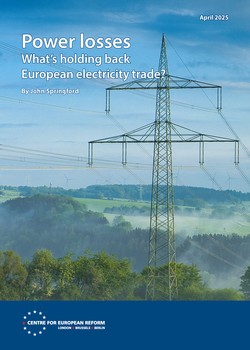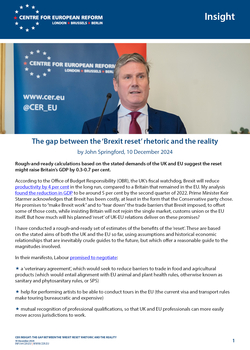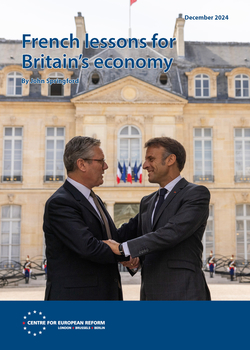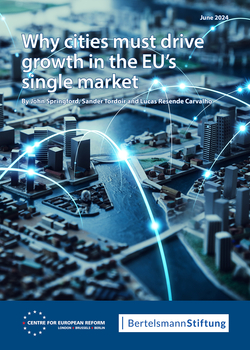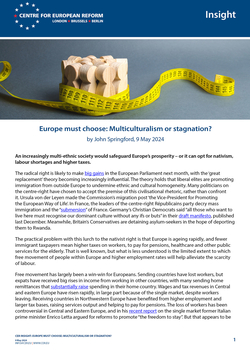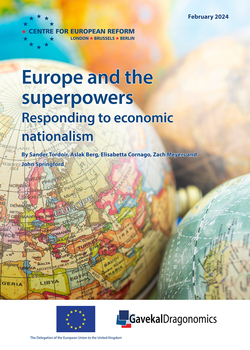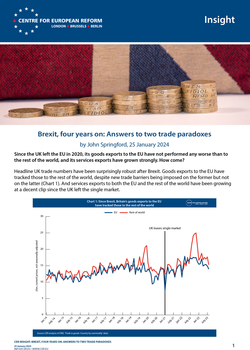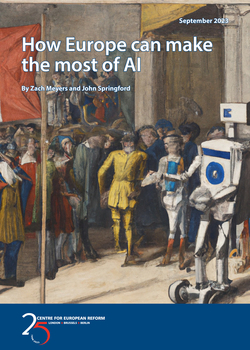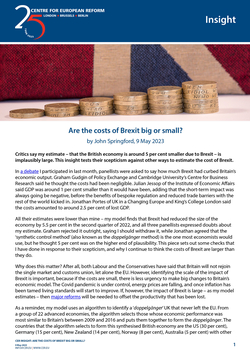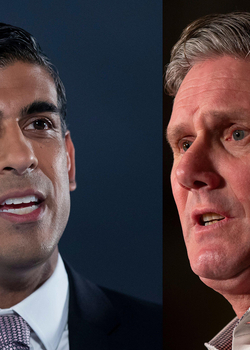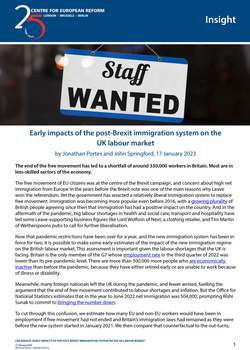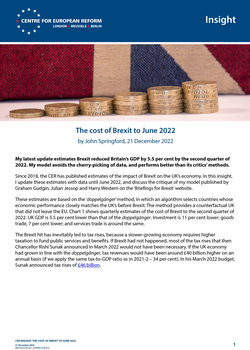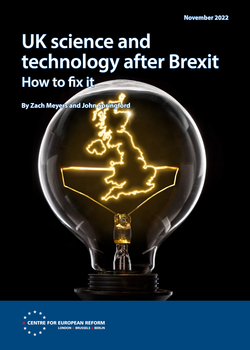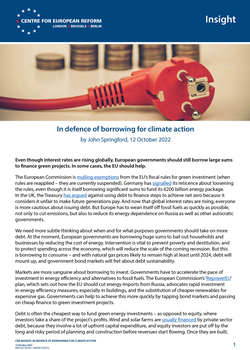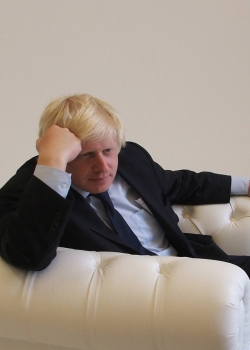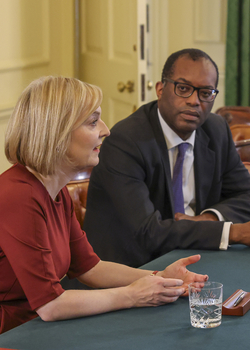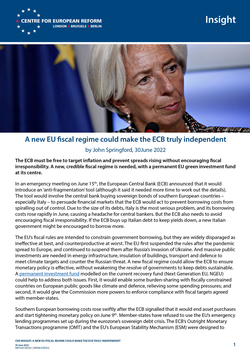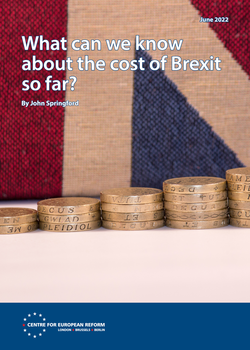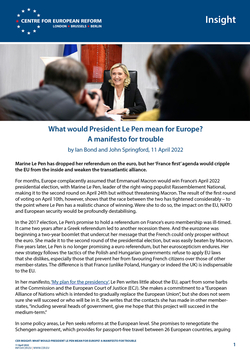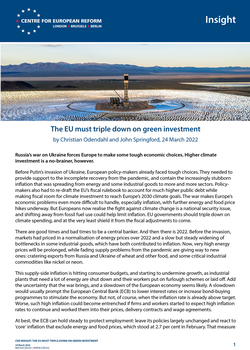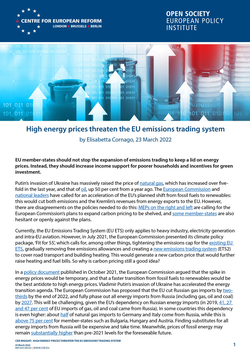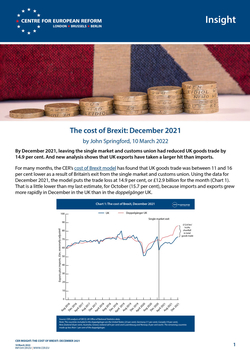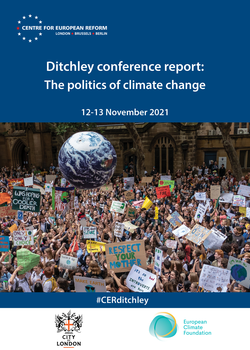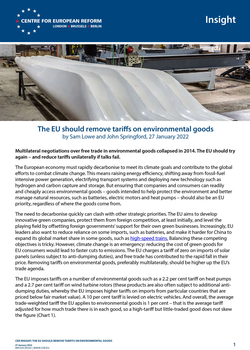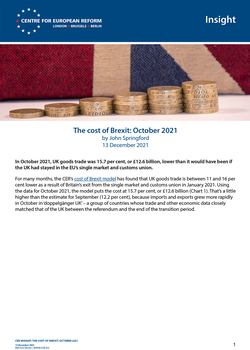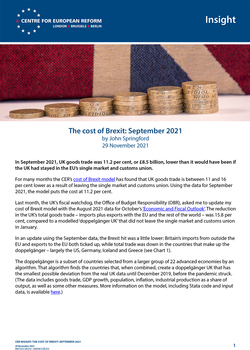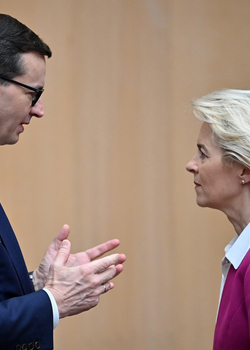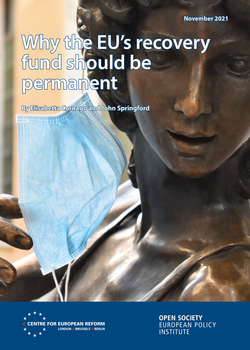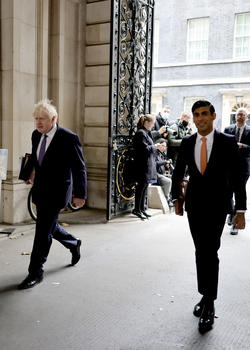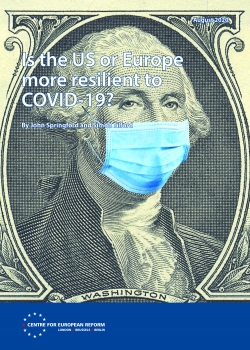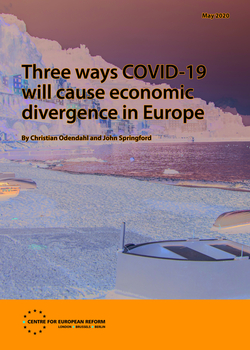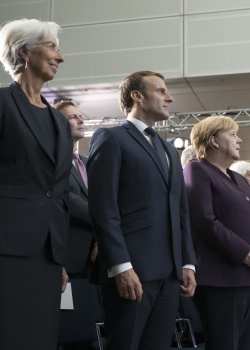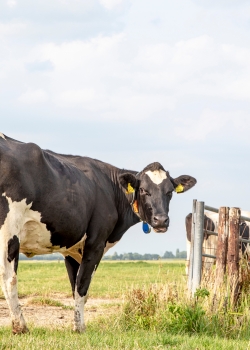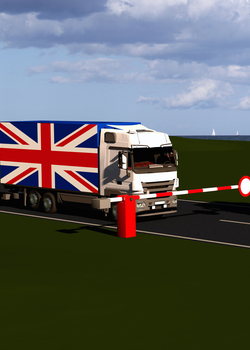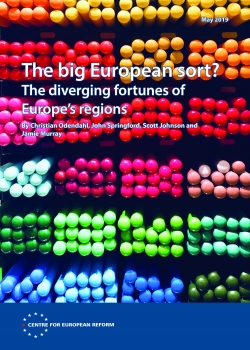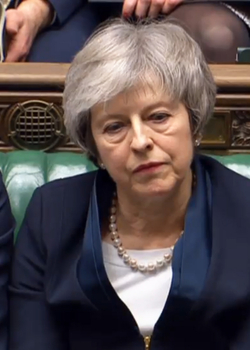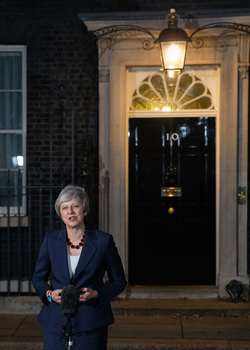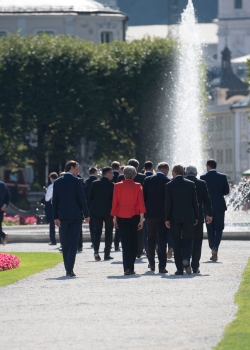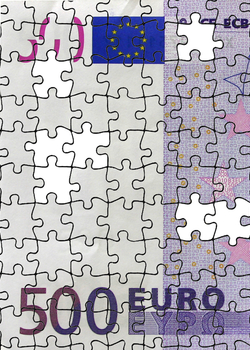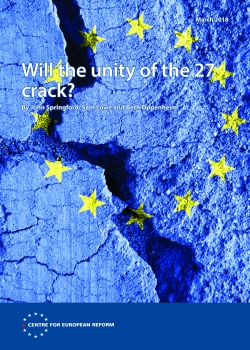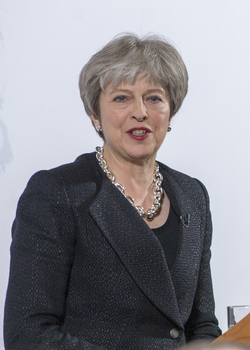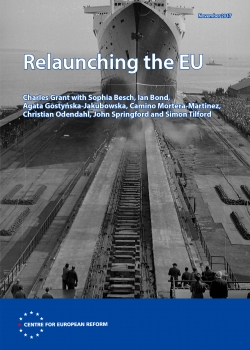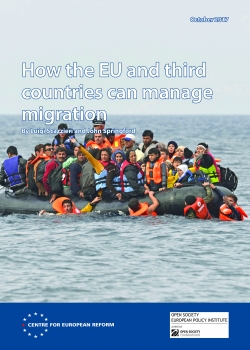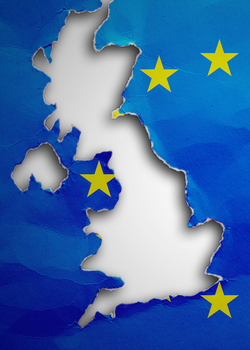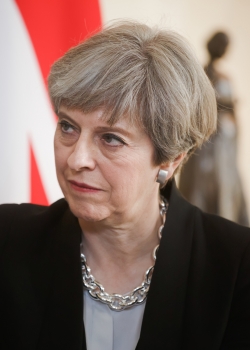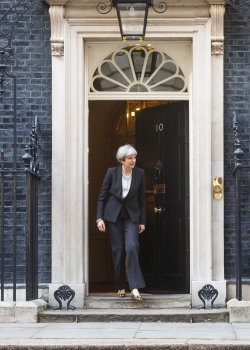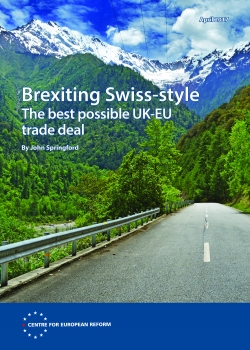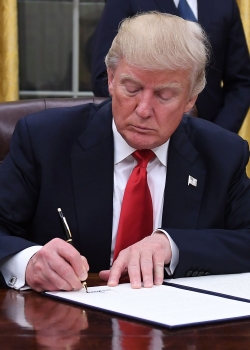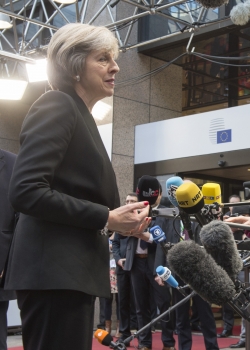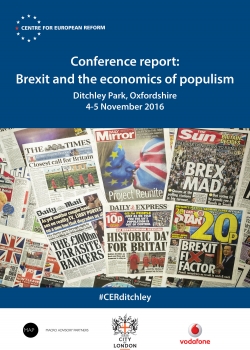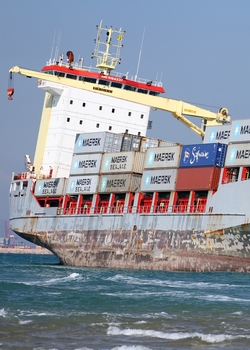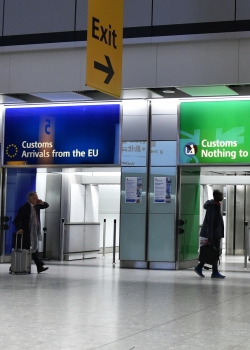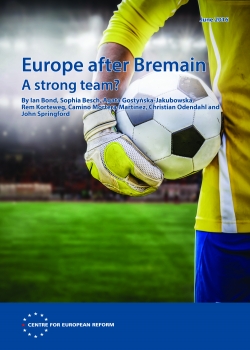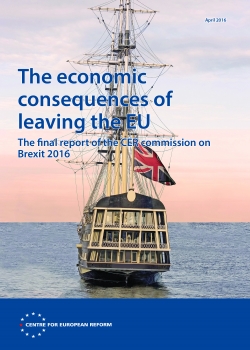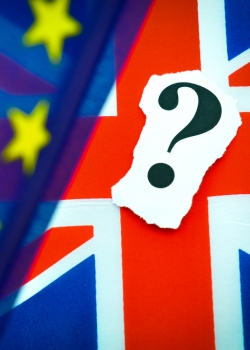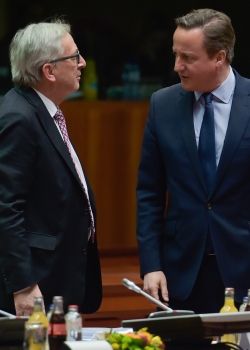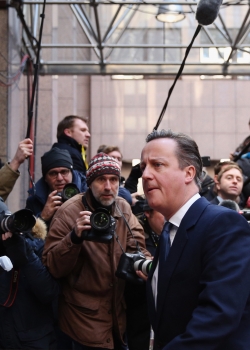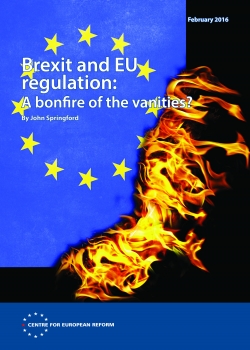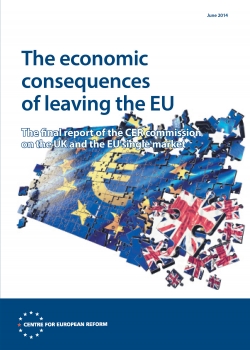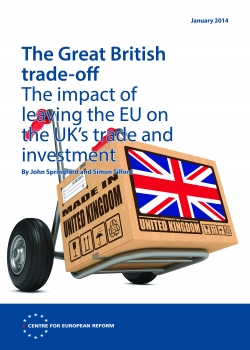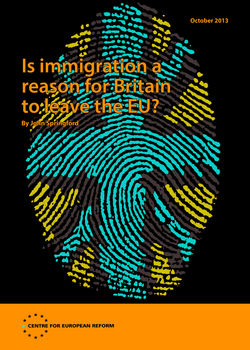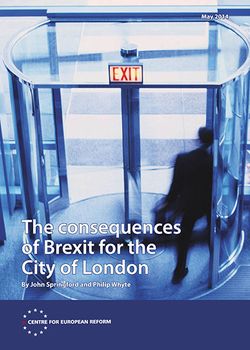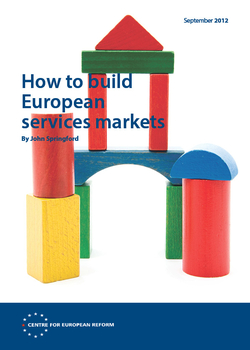John Springford
John Springford

Non-resident associate fellow
Areas of expertise
Britain and Europe, migration and labour markets, the single market and supply side reform, international trade, the euro, fiscal and monetary policy.
Twitter
Bluesky
T3VyIHJlc2VhcmNoZXJzIGNhbiBiZSByZWFjaGVkIHZpYSBlbWFpbCB1bmRlciBbZmlyc3RuYW1lXUBjZXIuZXU=
Reconciling UK migration policy with the energy transition
18 June 2025
Many foreign workers that are needed to deliver the British government's net zero mission will not meet its higher salary and skills thresholds for visas.
Power losses: What's holding back European electricity trade?
29 April 2025
The EU is falling behind in its push to create a European power market. This analysis sets out a five-point plan for the EU and national governments to hasten integration.
The gap between the 'Brexit reset' rhetoric and the reality
10 December 2024
Rough-and-ready calculations based on the stated demands of the UK and EU suggest the reset might raise Britain’s GDP by 0.3-0.7 per cent.
French lessons for Britain's economy
01 December 2024
Since 2008, the UK has had weak productivity growth compared to the US and France. But France's high-investment model offers more lessons for a smaller, more open economy like Britain.
Why cities must drive growth in the EU's single market
20 June 2024
By integrating European services markets and investing in cities with high potential, the EU can raise its anemic growth rate and spread economic activity beyond successful metropolises.
Europe must choose: Multiculturalism or stagnation?
09 May 2024
An increasingly multi-ethnic society would safeguard Europe’s prosperity – or it can opt for nativism, labour shortages and higher taxes.
Europe and the superpowers: Responding to economic nationalism
26 February 2024
Superpower competition poses a significant challenge for Europe's trade-intensive economy. The EU must evolve its toolkit and economic model to respond.
Brexit, four years on: Answers to two trade paradoxes
25 January 2024
Since the UK left the EU in 2020, its goods exports to the EU have not performed any worse than to the rest of the world, and its services exports have grown strongly. How come?
How Europe can make the most of AI
14 September 2023
AI may raise productivity – potentially substantially. European policy-makers should do more to ensure businesses use it, by regulating to clarify liability and ensuring vigorous competition between AI companies.
Europe can withstand American and Chinese subsidies for green tech
12 June 2023
European policy-makers are fretting about subsidised green tech imports from the US and China. But shipping costs are increasingly discouraging imports of these goods from faraway countries.
Are the costs of Brexit big or small?
09 May 2023
Critics say my estimate – that the British economy is around 5 per cent smaller due to Brexit – is implausibly large. This insight tests their scepticism against other ways to estimate the cost of Brexit.
Where is Britain's growth plan?
03 April 2023
The government will have to confront vested interests and raise investment to boost growth. A strategy founded on trade deals with far-off countries and deregulation won’t work.
Europe needs both fiscal and energy solidarity
14 March 2023
EU governments should curb energy subsidies and raise support for clean energy investment. The EU should expand common borrowing to fund green investment: this would accelerate the energy transition.
Early impacts of the post-Brexit immigration system on the UK labour market
17 January 2023
The end of the free movement has led to a shortfall of around 330,000 workers in Britain. Most are in less-skilled sectors of the economy.
The cost of Brexit to June 2022
My latest update estimates Brexit reduced Britain's GDP by 5.5 per cent by the second quarter of 2022. My model avoids the cherry-picking of data, and performs better than its critics’ methods.
UK science and technology after Brexit: How to fix it
28 November 2022
Brexit has hurt British science and slowed the deployment of new technology across its economy. Rejoining the single market may be politically unrealistic, but Britain can still limit the damage.
In defence of borrowing for climate action
13 October 2022
Even though interest rates are rising globally, European governments should still borrow large sums to finance green projects. In some cases, the EU should help.
Boris Johnson, Gerard Lyons and policy-based evidence making
11 August 2014
Conservatives say that leaving the EU would be better than the status quo, but where is the evidence?
Trussonomics has failed at the first hurdle
29 September 2022
Are the UK’s institutions strong enough to stop the government’s wrong-headed fiscal policy?
The US could cope with deglobalisation. Europe couldn't
03 August 2022
True ‘deglobalisation’ – disintegration of the global economy – would be triggered by a political event, like China invading Taiwan. That would be a big problem for Europe’s economy.
A new EU fiscal regime could make the ECB truly independent
30 June 2022
The ECB must be free to target inflation and prevent spreads rising without encouraging fiscal irresponsibility. A new, credible fiscal regime is needed, with a permanent EU green investment fund at its centre.
What can we know about the cost of Brexit so far?
09 June 2022
The UK's GDP is 5.2 per cent smaller than a modelled ‘doppelgänger’ UK that did not leave the EU; investment is 13.7 per cent lower, and goods trade, 13.6 per cent lower. Most of those costs are down to Brexit.
What would President Le Pen mean for Europe? A manifesto for trouble
11 April 2022
Marine Le Pen has dropped her referendum on the euro, but her ‘France first’ agenda would cripple the EU from the inside and weaken the transatlantic alliance.
The EU must triple down on green investment
24 March 2022
Russia’s war on Ukraine forces Europe to make some tough economic choices. Higher climate investment is a no-brainer, however.
High energy prices threaten the EU emissions trading system
23 March 2022
EU member-states should not stop the expansion of emissions trading to keep a lid on energy prices. Instead, they should increase income support for poorer households and incentives for green investment.
The cost of Brexit: December 2021
10 March 2022
By December 2021, leaving the single market and customs union had reduced UK goods trade by 14.9 per cent. And new analysis shows that UK exports have taken a larger hit than imports.
Ditchley conference report: The politics of climate change
02 February 2022
Climate change is as much a political problem as a technological one, and the CER's annual economics conference focused on ways to overcome inertia, denial and myopia.
The EU should remove tariffs on environmental goods
27 January 2022
Multilateral negotiations over free trade in environmental goods collapsed in 2014. The EU should try again – and reduce tariffs unilaterally if talks fail.
The cost of Brexit: October 2021
13 December 2021
In October 2021, UK goods trade was 15.7 per cent, or £12.6 billion, lower than it would have been if the UK had stayed in the EU’s single market and customs union.
The cost of Brexit: September 2021
29 November 2021
In September 2021, UK goods trade was 11.2 per cent, or £8.5 billion, lower than it would have been if the UK had stayed in the EU’s single market and customs union.
A permanent EU recovery fund can help Poland change
29 November 2021
The EU’s climate ambitions will add tension to its relationship with Poland. Making the EU’s recovery fund permanent would provide stronger incentives for Poland to embrace the energy transition.
Why the EU's recovery fund should be permanent
11 November 2021
The recovery fund will raise growth, and member-states’ investments and reforms are largely the right ones. But to make a big difference to climate change, the fund needs to be permanent and much larger.
The cost of Brexit: May 2021
21 July 2021
The Centre for European Reform estimates that leaving the single market and customs union has reduced UK trade in goods by £10 billion or 13.5 per cent in May 2021.
The cost of Brexit: April 2021
14 June 2021
We estimate that leaving the single market and customs union had reduced UK trade by 11 per cent in April 2021. That is on top of our previous finding of a 10 per cent hit to trade between the referendum and leaving the single market.
The cost of Brexit: March 2021
12 May 2021
We estimate that leaving the single market and customs union had reduced UK trade by 11 per cent in March 2021. That is on top of a 10 per cent hit to trade between the referendum and leaving the single market.
The cost of Brexit: February 2021
13 April 2021
We estimate that leaving the single market and customs union had reduced UK trade by 5 per cent by February 2021. That is on top of a 10 per cent hit to trade between the referendum and leaving the single market.
Why Europe should spend big like Biden
29 March 2021
The scale of Biden’s spending plans means the US economy will recover much faster than Europe’s. Yet in many ways it is the European economy that is in greater need of stimulus.
The cost of Brexit, January 2021: The end of transition edition
12 March 2021
The first of a new CER series provides estimates for the effect of Brexit on UK trade – both before and after the end of the transition period.
An unequal recovery would be politically explosive
29 January 2021
When restrictions are eased, office workers will spend while poorer people, who have been more likely to get COVID-19, may struggle. Governments need to find ways to make the recovery fair.
Brexit and COVID-19 are a toxic mix
15 October 2020
The second wave of COVID-19 is arriving just before the UK leaves the single market. The pandemic will make it harder for the economy to adjust to Brexit.
A trade deal would give the City of London breathing space
30 September 2020
The EU’s decisions on financial equivalence for the UK are formally separate from the trade deal under negotiation. But in reality, the two are linked.
Is the US or Europe more resilient to COVID-19?
04 August 2020
COVID-19 has exposed the lack of risk-sharing between US citizens. But Europeans should not be complacent: a permanent and more automatic fiscal union may be needed to secure 'the European way of life'.
To V or not to V
27 July 2020
The debate over the shape of the economic recovery continues. But recent medical advances should tilt governments towards continued support for workers and companies, because the pandemic may be over sooner than they had feared.
The recovery fund faces a tricky passage
29 May 2020
The Commission's proposed recovery fund is macroeconomically meaningful. The 'frugals' should focus less on negotiating away the transfers to harder-hit countries, and more on how the money is spent.
Three ways COVID-19 will cause economic divergence in Europe
21 May 2020
Europe's economies will diverge further as a result of COVID-19, as the economic impact will be larger in Southern Europe. Fiscal transfers would help to restart the EU's 'convergence machine'.
How the EU should co-ordinate an end to the COVID-19 lockdown
14 April 2020
European governments hope that contact tracing apps can allow them to ease lockdowns. But much work must be done at both national and EU level before restrictions can be eased.
The two economic stages of coronavirus
26 March 2020
European policy-makers must offset the huge costs of containing the virus, while keeping debt sustainable in all eurozone member-states. But they also need a plan to stimulate a V-shaped recovery.
CER podcast: How to contain the coronavirus fall-out
11 March 2020
The new coronavirus has been spreading rapidly in Europe, and Italy has imposed strict constraints on movement to contain the outbreak there.
Bold policies needed to counter the coronavirus recession
10 March 2020
The COVID-19 crisis is serious, and will have severe economic consequences. But if matched by aggressive action from fiscal and monetary authorities, the economic fallout is manageable.
Should the EU develop 'European champions' to fend off Chinese competition?
05 March 2020
China is distorting world trade through its aggressive industrial policy. But fostering ‘European champions’ in order to compete is premature – and risky.
CER podcast: A 'sovereign' EU needs a stable economy
26 February 2020
The EU’s economic size is its main source of global power. But what are the consequences of the eurozone’s economic instability – and its large current account surplus – for the EU’s ability to act on the global stage? John Springford and Christian Odendahl discuss.
Conference report: Five challenges for Europe
16 December 2019
A new CER report summarises its 2019 Ditchley Park conference, which brought together 50 leading economists to discuss 'Five challenges for Europe'.
How economically damaging will Brexit be?
28 November 2019
Forecasts of the long-term hit from Boris Johnson’s Brexit range from 2 to 7 per cent. There are several reasons to fear that that the costs will be on the higher side.
CER podcast: Reviewing 2019
18 December 2019
CER researchers review the year 2019, and discuss what to expect in 2020. The conversation spans the future UK-EU relationship; the fraying of the transatlantic link; China; the state of Franco-German relations; and the EU economy.
The EU budget needs climate-proofing
04 November 2019
Greenhouse gas emissions from Europe’s farms have been flat since 2005. The Common Agricultural Policy, which consumes 37 per cent of the EU’s budget, subsidises a sector that needs to clean up its act.
The cost of Brexit to June 2019
16 October 2019
The UK economy is 2.9 per cent smaller than it would be if the UK had voted to remain in the European Union, according to our latest estimate of the cost of Brexit to the end of the second quarter of 2019.
How would negotiations after a no-deal Brexit play out?
03 September 2019
After no deal, the EU would demand that the UK sign up to the provisions of the withdrawal agreement, but in exchange for an emergency deal that is far worse than the standstill transition.
Now is the worst time for 'global Britain'
27 June 2019
Global trade integration has stalled since the financial crisis, and is unlikely to pick up steam any time soon. In that context, plans for ‘global Britain’ will do little to offset the costs of Brexit.
Competition policy in the 21st century: Size isn't everything
04 June 2019
France and Germany have proposed laxer EU merger control to help European companies compete with Chinese firms. But competition has been waning within the EU, and stronger merger rules may be needed.
The big European sort? The diverging fortunes of Europe's regions
08 May 2019
Over the last 15 years, graduate workers and high-value services and technology firms have been clustering together in Europe’s most successful cities. This process may widen Europe’s political fault-lines in the future.
The cost of Brexit to December 2018: Towards relative decline?
30 March 2019
The UK economy is 2.5 per cent smaller than it would be if Britain had voted to remain in the European Union. The knock-on hit to the public finances is £19 billion – or £145 million a week.
The cost of Brexit to September 2018
27 January 2019
The UK economy is 2.3 per cent smaller than it would be if Britain had voted to remain in the European Union.
After the meaningful vote: What are Theresa May's options?
16 January 2019
Theresa May can only win a parliamentary majority for her withdrawal agreement by agreeing to negotiate a softer relationship with the EU.
Conference report: The politics of slow growth in Europe
19 December 2018
A new CER report summarises its 2018 Ditchley Park conference, which brought together 50 leading economists to discuss 'The politics of slow growth in Europe'.
Brexit deal done – now for the hard part
15 November 2018
Theresa May’s Brexit deal offers some crumbs to Tory hardliners, the DUP and soft Brexiteers. But if the deal passes through parliament, a UK-EU customs union is likely.
The cost of Brexit to June 2018
30 September 2018
The British economy is 2.5 per cent smaller than it would be if Remain had won in 2016, according to the latest update of the CER's cost of Brexit model.
The EU should not fret about Singapore-on-Thames
28 September 2018
At the Salzburg EU informal summit on September 20th, EU leaders read the last rites on Theresa May’s Chequers plan.
After Salzburg: How to salvage the Brexit negotiations
24 September 2018
Although EU leaders delivered the coup de grace to Theresa May’s Chequers plan in Salzburg avoiding no deal is still possible, but it will require some tough choices on the Irish backstop.
What's the cost of Brexit so far?
23 June 2018
New analysis by the CER – which we will update quarterly – estimates that the UK economy is 2.1 per cent smaller as a result of the vote to leave the EU.
Why Italy will confront the EU, but stay in the euro
04 June 2018
The new Italian government is likely to initially try to score some easy victories. The EU should give it some leeway, and avoid inflaming public opinion in Italy.
The German wage puzzle
02 May 2018
Shifts in the relationship between wages and unemployment in Germany mean the European Central Bank (ECB) should continue its stimulus for longer.
Will the unity of the 27 crack?
15 March 2018
Some British politicians believe that the 27 will divide during the Brexit trade negotiations, because of their differing economic interests. But disagreements between the 27 are minor, thanks to Theresa May's red lines.
Theresa May's Irish trilemma
07 March 2018
Theresa May must choose two of the following three options: an exit from the single market and customs union, no hard border with Ireland, and an all-UK approach to Brexit.
Britain's services firms can't defy gravity, alas
05 February 2018
Britain's specialism in traded services, some of which can be delivered electronically, has led Brexiters to claim that the country's trade will inevitably unmoor itself from Europe. In fact, Britain is not about to enter a "post-geography trading world".
Holding out hope for a half-way Brexit house
22 January 2018
The UK is considering 'managed divergence' from EU rules, which the 27 will reject. A better strategy would be to remain in the customs union and single market for goods.
The biggest Brexit boon for Germany? Migration
11 December 2017
Germany's economy desperately needs qualified immigrants to fill 780,000 jobs. Brexit will help it to do so.
Relaunching the EU
07 November 2017
The EU is ripe for fundamental reform. New policies are needed for migration and the euro. The EU also needs more flexible structures so that countries can opt in and out of key policies.
How the EU and third countries can manage migration
01 November 2017
The EU's response to migrants crossing the Mediterranean is shifting from internal reforms to deals with countries in Africa and Asia. This approach has potential pitfalls and upsides.
Populism – culture or economics?
30 October 2017
Are economic factors to blame for the rise of populism, or is it a cultural backlash? The answer is a bit of both: economic weakness strengthens social conservatives' illiberal views.
How strong a Brexit card is Britain's money?
19 September 2017
Britain’s strongest card in the negotiations is the money that the 27 claim it owes to the EU. But the money card gives Britain a pair rather than a flush.
How should the EU react to Britain's general election?
15 June 2017
The EU-27 can force Britain's politicians to acknowledge Brexit’s trade-offs, by offering the British four options from which it must choose.
What does the election result mean for Brexit?
09 June 2017
Brexit barely figured in the UK's general election, but the result means that the country might yet have an election fought explicitly on the issue.
Why no deal would be much worse than a bad deal
24 May 2017
Theresa May and several of her ministers have claimed that no Brexit deal would be better than a poor deal. They are wrong.
A prime minister unshackled
09 May 2017
Checks on prime ministerial power are weak in Britain – and Theresa May’s massive parliamentary majority after the general election will weaken them further. In the context of Brexit, this is dangerous.
Brexiting Swiss-style: The best possible UK-EU trade deal
24 April 2017
The softest form of hard Brexit that is plausible – given the red lines of the 27 and Britain – is something like Switzerland's deal with the EU.
Trump, trade and the EU: Two wrongs don't make a right
23 February 2017
The US will not gain by resorting to protectionism. If it does so, the EU should stay calm, listen when US criticism is justified, and make its first priority the defence of the WTO process and the rule of law.
Customs union membership is no way out of the Brexit trap
16 December 2016
Remaining in the customs union seems to be the least damaging way for Britain to ‘take back control’, but it is fraught with difficulties.
Brexit and the economics of populism
12 December 2016
Inequality, insecurity and a nativist backlash against immigration all help to explain the rise of populism. But globalisation does not prevent governments from addressing these problems.
Sterling slump won't rescue the British economy
21 October 2016
The 2008 devaluation did not prompt strong growth in British exports. The post-referendum fall in the pound is unlikely to do so either.
Why a hard Brexit looks likely
19 September 2016
Recent data suggests that the Brexit vote will not cause a recession. This, coupled with the fact that British voters rejected two important principles of the EU, makes a single market exit all but certain.
Britain will struggle to make EU migrants ‘go home’
05 August 2016
The British government is likely to let all EU migrants who arrive before the date of Brexit stay in the country. Other options may be politically attractive, but are impractical, of dubious legality, or against British interests.
Britain's limited options
18 July 2016
Britain is one of the more populous countries in Europe, is highly integrated with the European economy, and is 21 miles from France. These facts limit its room for manoeuvre in the Brexit negotiations.
CER podcast: The impact of a Brexit on different British regions
14 June 2016
John Springford talks to Sophia Besch about euroscepticism and hostility to immigration in England’s regions outside of London and the South East.
Brexiting yourself in the foot: Why Britain's eurosceptic regions have most to lose from EU withdrawal
13 June 2016
New data shows that the most eurosceptic regions of the UK are the most economically integrated with the EU.
Europe after Bremain: A strong team?
10 June 2016
If Britain votes to Remain, it should not revert to old habits of obstruction. In almost every field, it can serve its own interests best by making a positive contribution.
Can Britain join Norway in the EEA?
09 June 2016
Pro-EU MPs might try to force the UK to accept membership of the EEA – the ‘Norway option’ – if Britain votes to leave the EU. Charles Grant and John Springford debate whether this is likely.
The economic consequences of leaving the EU: The final report of the CER commission on Brexit 2016
21 April 2016
After leaving the EU, the UK would face an invidious choice: sign up to EU rules and the free movement of labour, or suffer economic damage.
The ideologues within
19 May 2016
Brexit will be a vote for less openness to trade, people and foreign culture, and a victory for ‘common sense’ and gut feeling over evidence.
The idea of buccaneer Britain trading freely outside the EU is a fantasy
The Telegraph
02 March 2016
We will always want to trade with Europe, because it's rich and close. The only question is the terms on which we will do so.
Would an 'independent' Britain want to join the single market?
24 February 2016
Three economic rules mean that Britain would seek to join the EU's single market if it were not already a member.
Cameron’s compromise
Prospect
20 February 2016
The PM's best bet now is to move the EU debate onto grander issues.
Deal done: Now for the hard work
20 February 2016
David Cameron did better than expected at last night's EU summit. But the deal will sway few voters, and Cameron must now make the case for the EU.
Brexit and EU regulation: A bonfire of the vanities?
03 February 2016
EU rules are no straitjacket for the British economy, and repealing them would be damaging: divergent regulations between the EU and the UK would curb trade and investment.
In-work benefits for EU migrants: How the British government dug itself into a hole
10 November 2015
The UK could make both Britons and EU migrants wait four years before having access to in-work benefits, but the ECJ might still rule it illegal.
The economic consequences of leaving the EU
09 June 2014
A group of experts finds that, after leaving the EU, the UK would face an invidious choice: sign up to the single market’s rules, or suffer economic damage.In April 2016 an updated version of the report The economic consequences of leaving the EU: The final report of the CER commission on Brexit 2016 was published.
Offline? How Europe can catch up with US technology
26 July 2015
The EU should not fret about the power of US internet giants. The take-up of digital technology across the services sector is more important than a 'European Google'.
The Great British trade-off: The impact of leaving the EU on the UK's trade and investment
20 January 2014
Eurosceptics think Britain can leave the EU and still have access to its markets. But to do so, Britain will have to sign up to EU rules.
Is immigration a reason for Britain to leave the EU?
01 October 2013
A 2013 policy brief that remains relevant today: Britons are increasingly hostile to one of the single market's four freedoms: the free movement of labour. But EU immigration makes Britain's economy stronger.
The consequences of Brexit for the City of London
08 May 2014
If Britain leaves the EU, the City of London will lose access to European markets – unless the UK aligns its financial rules with those of the EU.
Would Britain’s trade be freer outside the EU?
16 October 2014
A post-‘Brexit’ Britain would struggle to make up for foregone trade opportunities with the EU by signing trade agreements with non-European countries.
Cameron's EU reforms: You can't always get what you want
14 May 2015
David Cameron has outlined five areas for EU reform where compromise is possible. But trouble lies ahead on EU migrants’ access to welfare.
How to build European services markets
28 September 2012
European services markets are still overwhelmingly national. There are big economic gains to be made from opening them up.
Europe’s leaders are casting around for ways to improve the EU’s economic performance. In the long term, a more integrated single market for services could improve Europe’s weak productivity growth. The...
Europe’s leaders are casting around for ways to improve the EU’s economic performance. In the long term, a more integrated single market for services could improve Europe’s weak productivity growth. The...


